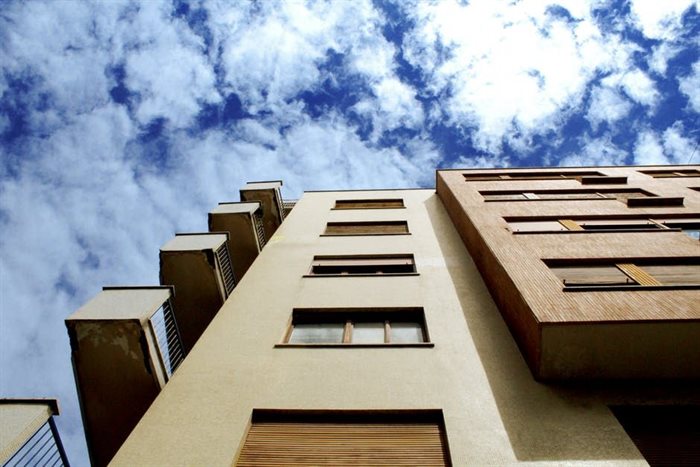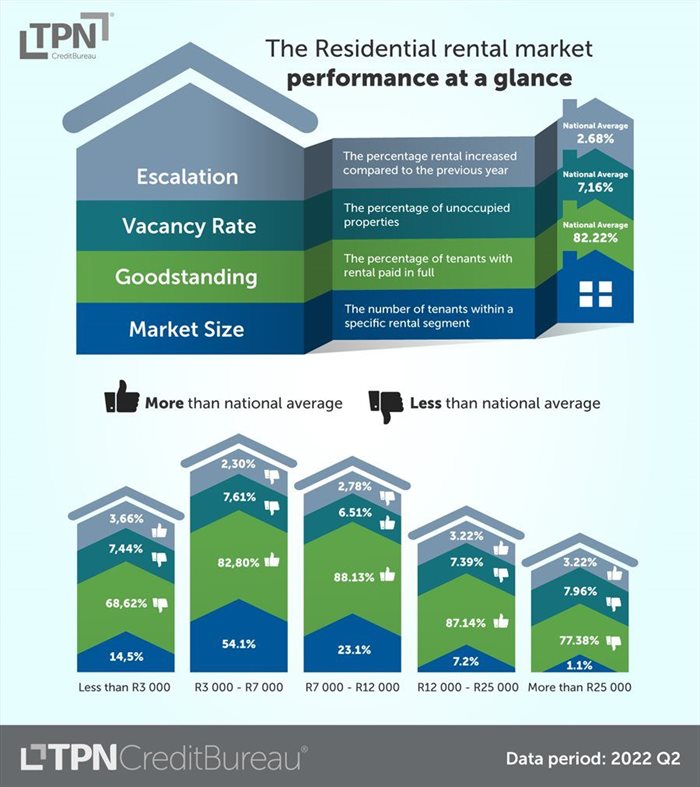According to the TPN Residential Rental Market Monitor for the second quarter of 2022, residential rental tenants are paying their rentals despite facing economic challenges which are being exacerbated by load shedding and higher fuel prices.
Consumers consider rental payments to be the second most important budget credit priority, second only to mortgage or bond repayments. The number of tenants in good standing with their monthly rental obligations improved from 80.78% in the first quarter to 82.22% in the second quarter. Tenants in good standing are those that have paid their rental in time and in full.
Tenants in the R7,000 to R12,000 and R12,000 to R25,000 rental brackets show a strong commitment to paying their rental on time, with 88% and 87% respectively in good standing. Although tenants paying between R3,000 and R7,000 – a rental bracket which makes up more than half the market – have not yet recovered to pre-pandemic levels, they continue to head in the right direction, increasing their good standing by 2% to 82.8%.
Bucking the trend, however, is the rental bracket above R25,000 with a noticeable deterioration in good standing to 77.38%. The deterioration has precedent, however, and is partly attributable to the cyclical nature of tourism, particularly in the tourism regions. Although this rental bracket traditionally experiences a drop in the second quarter of the year, it tends to strengthen again in the third quarter.
Provincial performance
From a provincial perspective, KwaZulu-Natal’s tenants in good standing figure dropped to 80.16% while its vacancy rate remained high at 9.91%. KwaZulu-Natal has the highest rental escalations of all provinces at just under 5%.
Gauteng continues to struggle to achieve higher escalations with rentals growing at just 1.69% year-on-year. The province has a low vacancy rate at 6.67%, a figure which is expected to increase as supply is added. Only 80.62% of tenants are in good standing in the province.
Steep rental increases of 4.17% in the second quarter in the Western Cape have not impacted landlords' ability to collect rentals. The province’s good standing figure is at 86.61% while its vacancy rate remains stable.
The Free State and North West are both struggling to collect rent as a result of a high rate of unemployment in both provinces (40.3% and 49.2% respectively).
Impact of interest rate
Higher interest rates have traditionally resulted in improved demand for rental property. However, the balance in a fragile economy is a fine line between demand shift and the ability of consumers to afford any type of formal rental accommodation. The South African Reserve Bank’s recent repo rate hike to 6.25% is expected to slow residential property sales down, although prices in certain areas are expected to continue to climb as demand in well-serviced areas remain attractive assets.
Employment figures typically correlate with the formal rental market with improved employment figures combined with higher interest rates tending to drive demand for rental properties. Stats SA’s Quarterly Labour Force Survey – which measures the unemployment rate - showed a small decline in the number of unemployed people in the second quarter. However, its more recently published Quarterly Employment Statistics – which measures employment – found that total employment declined in the second quarter, losing 119,000 jobs.
Increasingly more expensive to rent
The Consumer Price Index (CPI) eased during the pandemic which resulted in lower interest rates. This, combined with the work-from-home trend, encouraged certain segments of the market to purchase property which, in turn, fuelled a property inflation blaze. The residential property market is mirroring the end of the low interest era and landlords are passing their higher costs on to tenants which is making it increasingly more expensive to rent.
TPN Credit Bureau’s long-term data indicates that consumer strain is almost always shared with property owners, reflecting either in higher vacancies, lower returns or late payments. Encouragingly, the data reveals that tenants are still prioritising their rentals.



















































